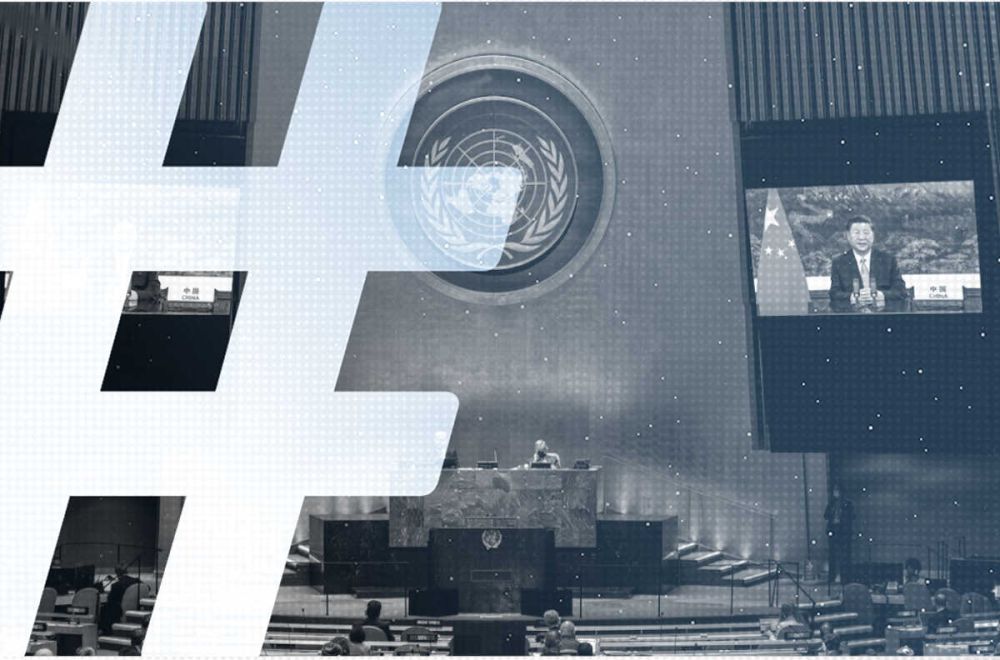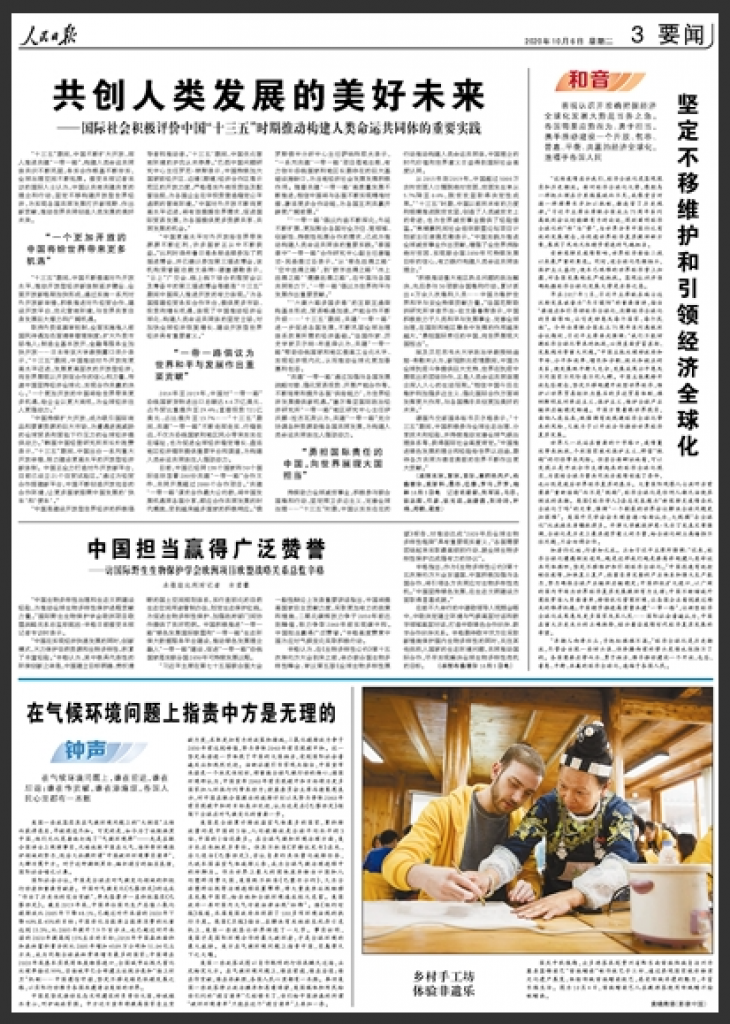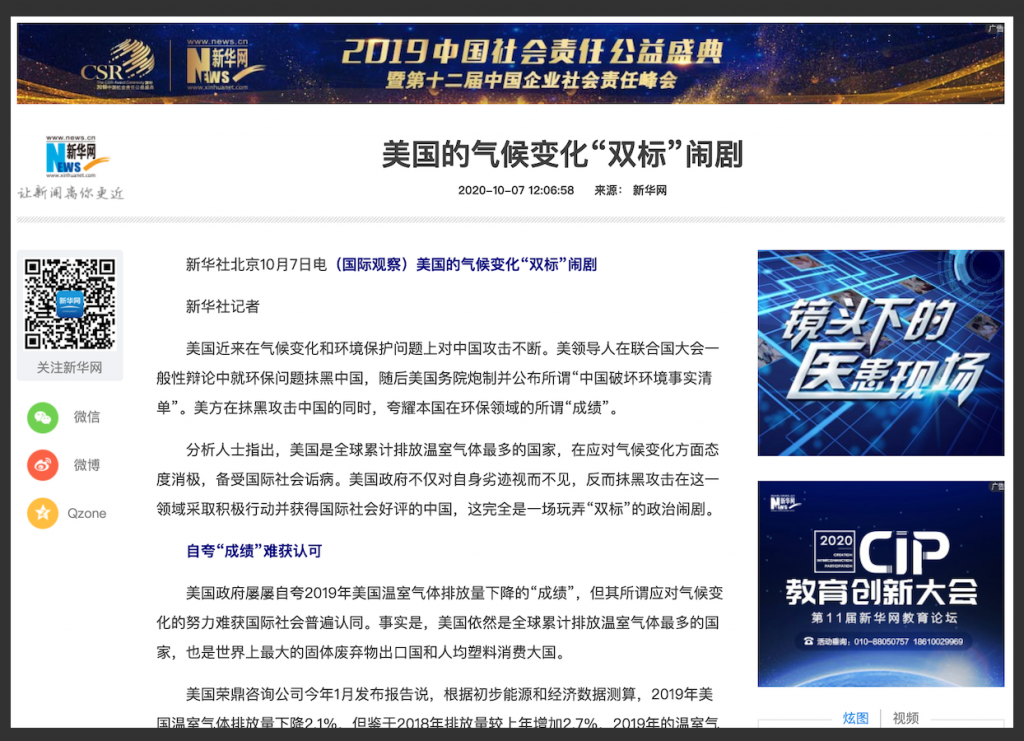
For two years now, tensions between China and the US – over trade, Covid-19, technology and human rights – have simmered in the pages of the People’s Daily, the Chinese Communist Party’s flagship newspaper. Some of the choicest and most churlish barbs have been delivered by “Zhong Sheng” (钟声), a byline reserved for official commentaries on international affairs. Back in June, “Zhong Sheng” – a team of writers, not an individual – responded to US sanctions over Hong Kong by railing against certain “despicable” American politicians who “have no international morality.”
Since last month, the war of words has had another topic of contention – national records on environmental protection. And the sparks are flying in China’s Party-state media.
The bickering was set off on September 23, as Xi Jinping sought in a video address to the UN General Assembly to demonstrate China’s leadership on climate change, pledging that China would reach “peak carbon” before 2030, and would reach nearly zero emissions by 2060. Xi’s speech starkly contrasted that of US President Donald Trump, who savaged China not just for being the top emitter of CO2, but for destroying “vast swaths of coral reef,” and emitting “more toxic mercury into the atmosphere than any country anywhere in the world.”
“Those who attack America’s exceptional environmental record while ignoring China’s rampant pollution are not interested in the environment,” Trump said. “They only want to punish America, and I will not stand for it.”
Xi’s pledge “stunned climate action observers,” some suggesting it could be a “defining moment” in tackling the global climate crisis. Others, meanwhile, cautioned skepticism, noting a clear whiff of opportunism in China’s latest promise. Li Shuo, of Greenpiece Asia, read Xi’s climate pledge as a shrewd geopolitical play, a “calculated move” to capitalize on inaction from the United States – particularly in light of the Covid-19 crisis. “It demonstrates Xi’s consistent interest in leveraging the climate agenda for geopolitical purposes,” Li told the BBC.
It’s an understatement to say that the US, now the only country that has not set a target to reach carbon neutrality, has failed to demonstrate leadership on the environment. Donald Trump has vowed to abandon the Paris Agreement on climate change, and an official exit would come after the November elections. China, eager to step firmly into a global leadership role it has proclaimed perhaps too zealously in the midst of Covid-19 – the latest Pew Research survey showing that unfavorable views of China have reached an historic high globally – has sought to capitalize on the US retreat in this area.
Xi’s pledges aside, the fact remains that China is the world’s biggest climate polluter – accounting for more than one quarter of total global emissions – and its largest consumer of oil and coal. Fossil fuels, including coal, currently account for 85 percent of China’s energy mix. Experts say the country would need to entirely flip its ratio of fossil fuels to renewables by 2060 (meaning 85 percent of its energy would come from renewables) to reach the goal Xi set in last month’s video address. Far from moving in this direction, however, China has continued to commit to new investments in coal, both at home and abroad, and climate experts have warned that a “new wave of coal power in China would pose clear risks for global efforts to limit climate change and could greatly complicate the country’s own energy transition.”
The poor US record on climate change under Trump notwithstanding, some have argued that China’s performance on the environment globally offers the US an opportunity to weaken Xi Jinping’s standing on a key issue internationally. “A more enlightened U.S. strategy could turn China’s environmental destruction – now being exported globally – to its advantage,” Jonathan E. Hillman wrote today for Nikkei Asia. Whatever China may pledge to do, many across Europe and North America have grown weary of its assurances, and the apparent ease with which it promises the heavens (“promise fatigue” being a commonly cited complaint of late).
The US again threw down the gauntlet on September 25, just two days after the Trump and Xi addresses at the UN, as the Department of State released a fact sheet on China’s “environmental abuses,” targeting not just its environmental record at home, but also alleging that it is “exporting its willful disregard for the environment through its One Belt One Road initiative,” referring to Xi Jinping’s signature foreign policy program. As an aside, it is interesting to note that while the State Department fact sheet refers to the “One Belt One Road initiative,” this abbreviation for the policy has not been used since 2016, predating the Trump presidency. The preferred term now, of course, is the “Belt and Road Initiative,” or “BRI.” But the State Department seems recently to have reverted to the use of “OBOR,” as in this recent briefing on restrictions on individuals and corporate entities, and in this recent testimony on countering China.
In any case, China has been quick to register its unhappiness with the US takedown of its record on climate change. In a commentary on Tuesday, “Zhong Sheng” was clearly hot under the collar. “Certain American politicians have become notorious for their ‘great regression’ on climate and environmental issues, and this has long been known,” the commentary began.
How preposterous it is that lately, in order to discredit China and blacken China’s name, they have with unparalleled foolishness played the ‘environment card’— first, disregarding facts at the United Nations, unjustifiably discrediting China’s efforts on environmental protection in such areas as the atmosphere and the oceans, then, fabricating a so-called ‘Environmental Abuses Fact Sheet’ that slanders China. Seeing this reversing of black and white and weaving of lies, the international community snorts with contempt.

The commentary, appearing on page 3 of the People’s Daily, said again that “certain politicians in the US have tried to conceal themselves through clever actions,” but that the world would not be fooled. “On the climate question, when it comes to who is moving forward, and who is moving backward, who is making contributions and who is causing trouble, the people of different countries have a sense in their hearts,” it said.
Back in April this year, CMP Co-Director Qian Gang noted the use in official statements in China of the term fèngquàn (奉劝), or “advise,” which has a strong admonishing tone, and could be seen to mark a slightly more belligerent or insistent tone in China’s diplomacy. “[The] ‘advisory vocabulary’ of the Chinese Communist Party is something we should watch closely in the party-state media as an indicator of China’s attitude and tone in its foreign relations,” Qian wrote.
Tuesday’s “Zhong Sheng” commentary again uses this more spirited form of “advise,” warning “certain American politicians” to avoid adding to their “list of lies.”
We advise certain American politicians to stop their political manipulation and malicious slander. The “list of lies” attributed to you by the US media and netizens is long enough already. This so-called “Environmental Abuses Fact Sheet” you have put together for China can only add to this “list of lies.”
A piece yesterday from the official Xinhua News Agency, “America’s ‘Double Standard’ Farce on Climate Change,” said that “US leaders smeared China on environmental issues during the general debate of the United Nations General Assembly, and then the US State Department concocted and published the so-called ‘China’s Environmental Abuses Fact Sheet.’”
There is no disputing that China is the world’s largest emitter of carbon dioxide, accounting for 28 percent of the global total, according to Earth System Science Data. The US was the largest national emitter of CO2 only until 2006, when China took the top spot. But the Xinhua article dwells instead on cumulative CO2 emissions, a measure that accounts for emissions going back to 1750 and the start of the industrial revolution. The Xinhua article suggests that “analysts have pointed out that the United States is the country emitting the most cumulative greenhouse gases in the world.”
The US government not only turned a blind eye to its own bad deeds, but also discredited and attacked China, which has taken active steps in this area and won praise from the international community. This is a political farce played with ‘double standards.’”

Last month, Foreign Ministry Spokesperson Wang Wenbin (汪文斌) also cited cumulative CO2 emissions in responding to Trumps accusations at the UN. “In contrast [to China’s conduct], the United States, as the country with the most cumulative greenhouse gas emissions in the world, refused to ratify the Kyoto Protocol and withdrew from the Paris Agreement,” Wang said. “It ignores its own binding and quantitative emission reduction tasks, and refuses to take minimum actions to protect the earth’s homeland.”
Wang also drew attention to other measures of environmental shame. “The United States is the world’s largest exporter of solid waste and a major consumer of plastic per capita,” Wang said. It is certainly true that developed nations in North America, Europe (and Australia) are the largest exporters of waste, heading off for disposal in developing countries. China was long a willing recipient of these global waste flows, but that changed in January 2018, as it banned 24 types of solid waste for import.
On September 28, Beijing Youth Daily ran a strongly-worded commentary that widely made the rounds on China’s internet, directly counter-attacking the US for the State Department fact sheet, which it said had “done its utmost to discredit China on issues of climate change and environmental protection.” The commentary said that the US would “only prove itself ridiculous again” by touting its supposed achievements in an area in which it refused to lead. But the piece could not resist returning to the litany of other disputes with the US — and relishing in its internal problems.
At present, Covid-19 continues to spread in the US, and social strife, racist conflicts and other issues have become prominent. In order to divert the attention of the domestic audience, certain US politicians continue frantically to shift the blame to China, turning it into a ‘scapegoat’ for the problems arising from their own ineffectiveness. Again and again, they display ‘[warning] cards’ on issues such as the South China Sea, Hong Kong, Xinjiang and so on, spreading rumors, engaging in smear campaigns, provoking discord, and suppressing China by all means. The drunkard’s heart is not in the cup.
Whatever measures one applies on the question of the environment, the US and China are undeniably the world’s largest polluters, and the cooperation of both is crucial to tackle what the UN has called “the defining issue of our time.” It goes without saying that the insults and empty promises volleying back and forth between the leaders of the two countries at the moment are wasted words at a time when real action is more urgent than ever.




















